Hearing that Sita had been seen in Lankapuri, Hanuman took on his gargantuan form and made a colossal leap across the sea. Landing on the island, he contracted himself to his usual form.
He couldn’t believe his eyes, Lankapuri was such a beautiful place with lush green mountains and valleys. The houses were all decorated with jewels and pearls; the people were very joyful, enjoying themselves with singing and dancing. He arrived at dusk and started moving inland, looking for the grove seen by the eagle Sampaathi.
Immediately, Hanuman encountered Lankini, a huge rakshasi (Demoness) who was the guardian of Lankapuri. She refused to let Hanuman enter. Hanuman knocked her to the ground with his left hand. She accepted her defeat and let him go inland.
Hanuman searched everywhere for Sita: the castles, every house, every garden, even searching for her in Ravana’s private chamber, but was unable to find her. He felt hopeless, and sat on a compound wall muttering the mantra, “Ram, Ram, Ram, Ram….”
Then he saw a lady in the faint moonlight, under a simsupa tree in the middle of the grove compound. The lady was in dirty clothes, hanging her head down with unbearable sorrow. She was surrounded by rakshasis.
Hanuman knew he had found Sita and jumped up in joy. Immediately realizing he needed to lay low until he met Sita, he suppressed his joy and looked for an opportunity to greet her. He got in the top of a tree close to Sita and waited impatiently. While waiting, he heard all the rakshasis, except one, harassing Sita to get married to Ravana. But one rakshasi was very polite to Sita, not allowing anyone to harm her in any way.
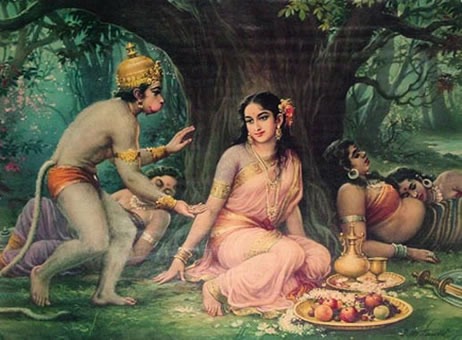 When all the rakshasis fell asleep, Hanuman crawled towards Sita. He reached Sita and said that he is a messenger from Rama. At first Sita refused to believe him, as Ravana had tried to get to her by taking different forms and she assumed this is again one of Ravana’s tricks. But later, Hanuman gives her Rama’s signet ring as proof, again uttering “Ram, Ram, Ram, Ram….” This cleared Sita’s doubt, and with tears in her eyes, she inquired of her husband’s wellbeing.
When all the rakshasis fell asleep, Hanuman crawled towards Sita. He reached Sita and said that he is a messenger from Rama. At first Sita refused to believe him, as Ravana had tried to get to her by taking different forms and she assumed this is again one of Ravana’s tricks. But later, Hanuman gives her Rama’s signet ring as proof, again uttering “Ram, Ram, Ram, Ram….” This cleared Sita’s doubt, and with tears in her eyes, she inquired of her husband’s wellbeing.
Hearing that Rama is in deep worry and lost in thought all the time made her even more depressed. Hanuman jumped down and said he could destroy Lankapuri and take her back with him at once. Sita disapproved of the idea, saying that Rama should be the one to come and rescue her from Ravana. She also added that she will keep herself alive only for one more month, so Rama should come and rescue her within that month.
Hanuman bowed to Sita and worshipped her, vowing that Rama will be in Lankapuri soon to take her back. Sita blessed Hanuman and gave him her Chudamani (jewelry for the hair/head) to give to Rama.
Being the mischievous monkey that Hanuman is, he decided to show Ravana what will be coming his way soon if he doesn’t release Sita. Hanuman began by destroying the fine parks and gardens, hoping that the guards would capture him and take him to Ravana. After several other people tried, Ravana’s son Indrajit himself came to capture him, which Hanuman allowed. He was taken to the palace for questioning by the king, exactly what Hanuman had wanted.
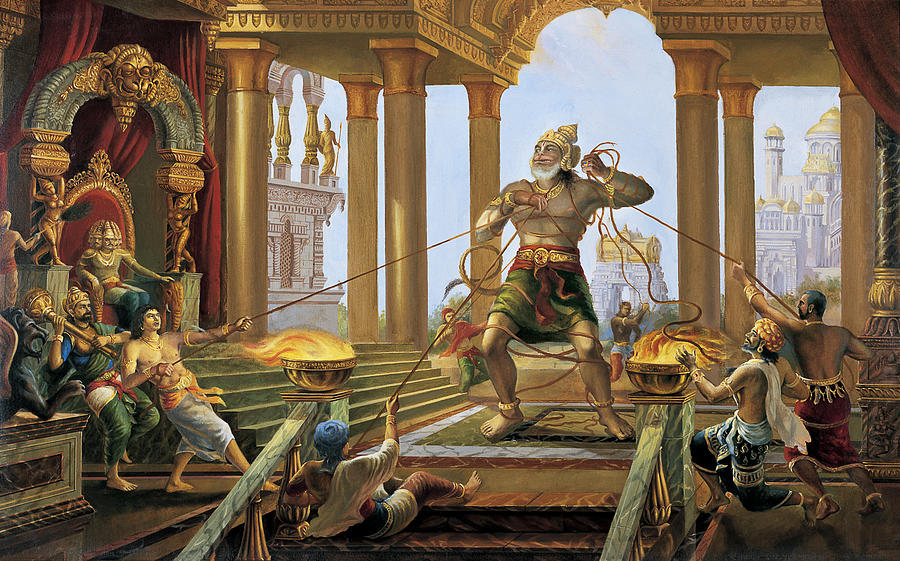 Brought to Ravana, Hanuman was made to stand in front of him with his hands and legs tied up. As soon as he saw Ravana, Hanuman freed himself and grew his tail to a length where he could make a throne for himself and sat on it as an equal to Ravana. Ravana was very upset about the “monkey’s” behavior.
Brought to Ravana, Hanuman was made to stand in front of him with his hands and legs tied up. As soon as he saw Ravana, Hanuman freed himself and grew his tail to a length where he could make a throne for himself and sat on it as an equal to Ravana. Ravana was very upset about the “monkey’s” behavior.
Hanuman said, “I am Hanuman, a messenger from Rama!” Obviously that led to an altercation between Ravana and Hanuman. Hanuman tried to persuade Ravana to release Sita, which obviously didn’t succeed. At the end, Ravana gave a verdict —the punishment for destroying the fine parks and gardens is death.
One of Ravana’s brothers, Vibhishana, intervened to stop the verdict, saying it is against the law to kill a messenger. Therefore Ravana decided to humiliate Hanuman and ordered that his monkey tail be set on fire and that he be thrown out of Lankapuri.
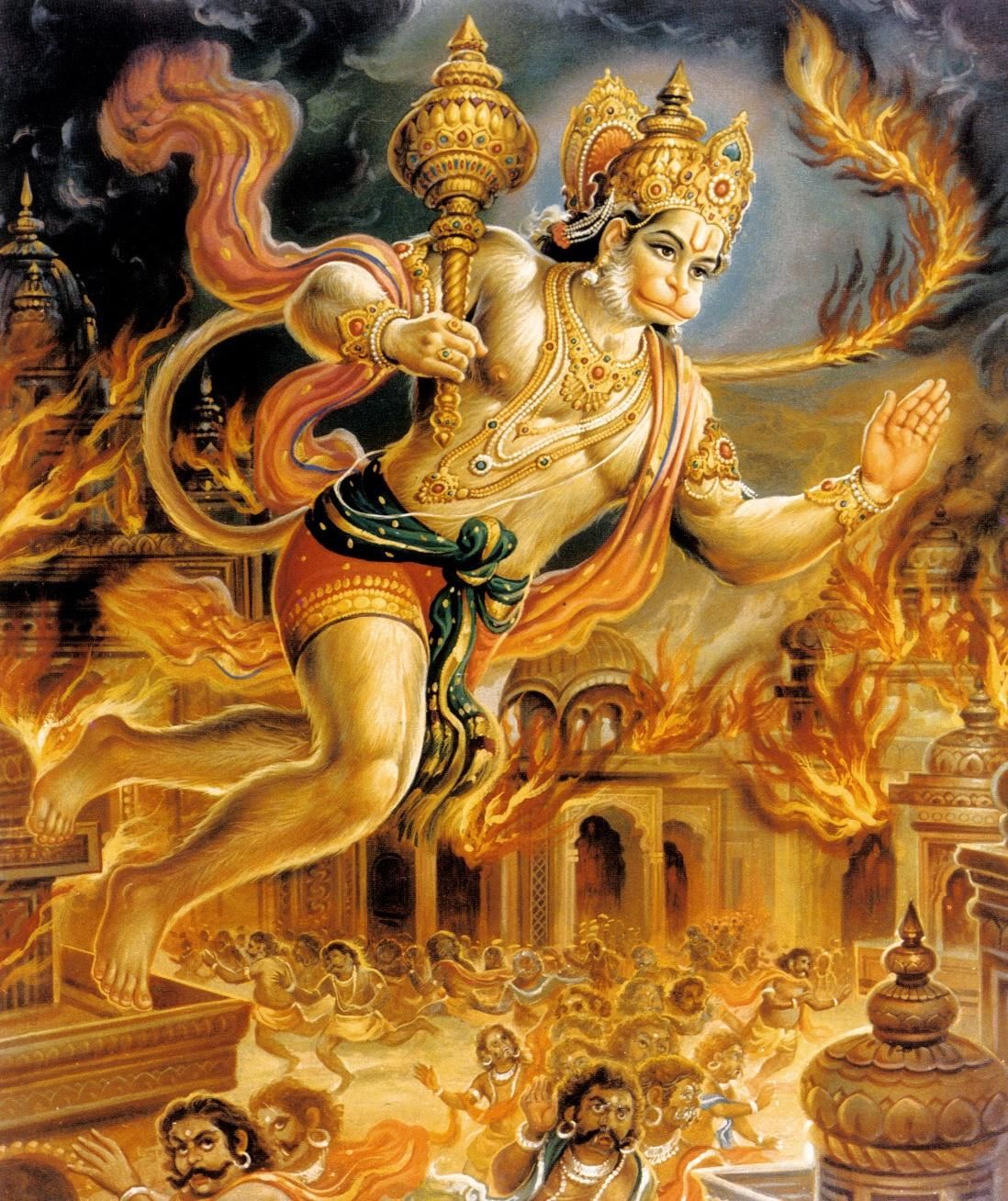 As soon as his tail was set on fire, Hanuman jumped up to do what a monkey does, jumping from pillar to pillar, structure to structure, tree to tree, burning the whole city of Lankapuri. Then, with a world of joy, Hanuman reassumed his gargantuan form and lept across the sea to the southern beach where his search party awaited. Hanuman told everyone the wonderful news about meeting Sita in Lankapuri and the rest of the encounter with Ravana. Angada, Hanuman and the southerly crew returned to Kishkindha.
As soon as his tail was set on fire, Hanuman jumped up to do what a monkey does, jumping from pillar to pillar, structure to structure, tree to tree, burning the whole city of Lankapuri. Then, with a world of joy, Hanuman reassumed his gargantuan form and lept across the sea to the southern beach where his search party awaited. Hanuman told everyone the wonderful news about meeting Sita in Lankapuri and the rest of the encounter with Ravana. Angada, Hanuman and the southerly crew returned to Kishkindha.
As soon as Hanuman saw Rama, he cried “I saw Mata Sita!” He immediately gave the chudamani to Rama. Rama took the chudamani in his hands and immediately burst into tears. The thought of Sita being so helpless and suffering broke his heart even more. With great haste, everyone got ready to go to Lankapuri. The vanara (monkey) army was mobilized in no time.
Rama, Lakshmana, Sugreeva and the army, with Hanuman, reached the southern tip of the land. Now the hurdle was to cross the sea between India and Lankapuri. Flabbergasted, but not losing heart, they discussed options. They decided to build a bridge (Setubandhanam). The architect monkey Nala, son of the master builder Vishvakarman, was given the task.
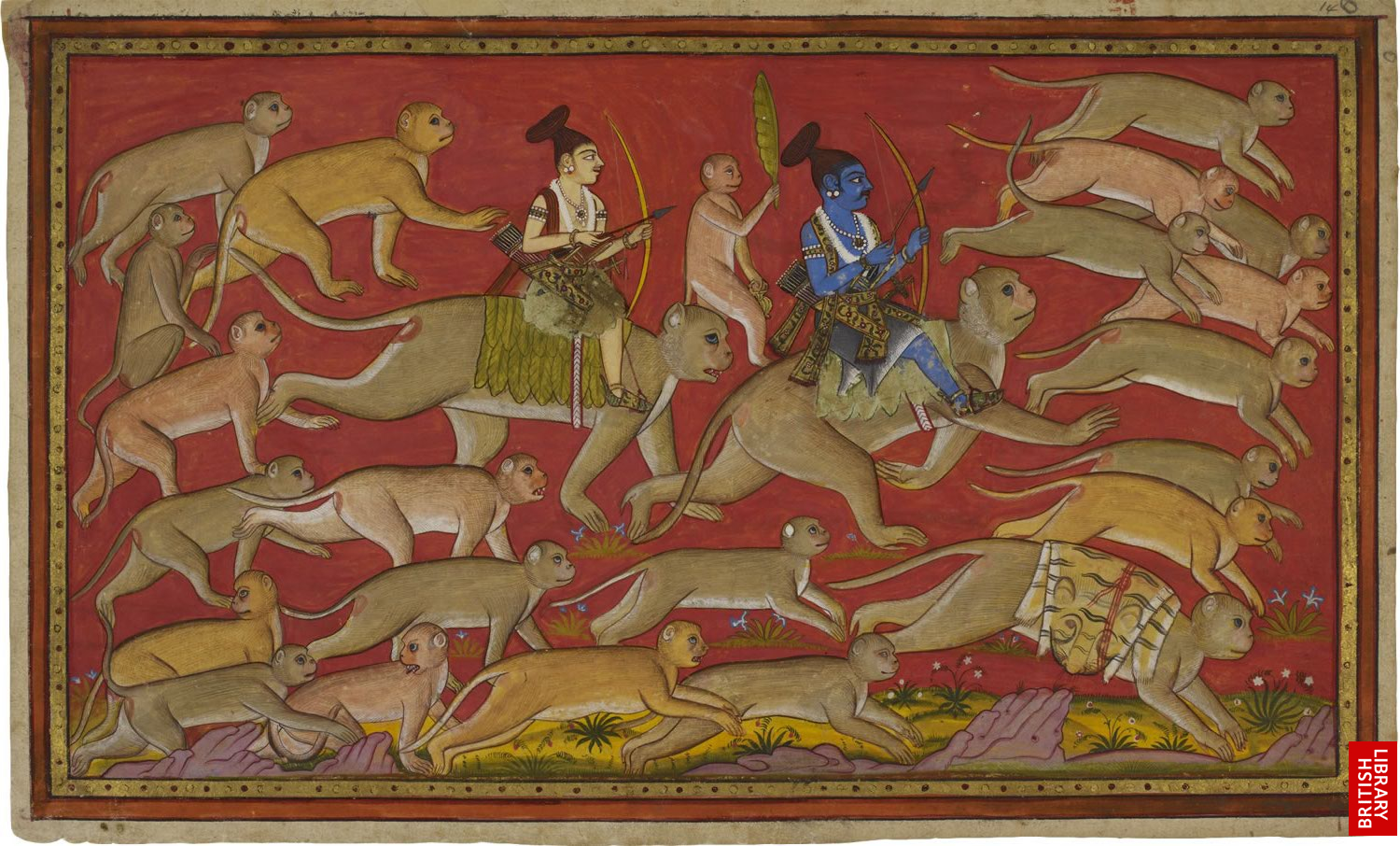 The news reached Ravana that an army of vanaras was in the southern tip of India. He called his war council to discuss the matter. Everyone in the council took it easy because it was only two humans (considered less powerful than themselves, the rakshasas) and the army itself consisted of monkeys. All the counselors, including his relatives, gave speeches urging Ravana to fight, assured the victory would be easy.
The news reached Ravana that an army of vanaras was in the southern tip of India. He called his war council to discuss the matter. Everyone in the council took it easy because it was only two humans (considered less powerful than themselves, the rakshasas) and the army itself consisted of monkeys. All the counselors, including his relatives, gave speeches urging Ravana to fight, assured the victory would be easy.
The only person who voiced concern was Vibhishana, who said that it was foolish of anyone to underestimate their enemy, gauging only by their looks, without doing proper investigation. He also reminded them that the brothers Rama & Lakshmana had already killed Ravana’s brothers Khara and Dushana, plus his uncle Maricha, in addition to other well-known figures from the rakshasas. Vibhishana also pointed out that Rama had done nothing to Ravana, whereas Ravana had cowardly abducted Rama’s wife while she was unprotected; therefore Ravana does not have the righteousness grounds in the war in hand.
Vibhishana pleaded with his brother to return Sita to Rama, even to beg for his pardon. He reminded Ravana that all the wealth and power he enjoyed was received from Lord Shiva, by being his ardent devotee, and it was tainted by his act. He must do the right to undo the wrong. Vibhishana offered to take Sita to Rama and seek his forgiveness on behalf of Ravana.
Hearing this enraged Ravana. He accused Vibhishana of envy, ill-will and being the worst enemy of the king. Feeling deeply offended by his brother’s words Vibhishana renounced Ravana, saying he cannot support an unrighteous person even it was his own brother. Ravana banished Vibhishana from Lankapuri, calling him a coward, sparing his life only because he was his brother. Ravana then continued to discuss the strategy for the upcoming war with the council.
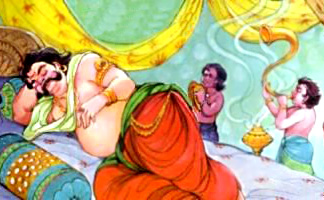 As the first order of action, needing assistance from his other brother, Ravana directs his guards to wake Kumbhakarna. Kumbhakarna slept six months of every year, due to a twist in his tongue when he requested a boon from Brahma after doing austerities. He requested “Nidraasana,” the seat of sleep, instead of “Indraasana,” the seat of Indra (Lord of Heaven). Thus he sleeps six months, then eats anything he sees for the other six months of the year, before going back sleep. Though he was an intelligent, unchallenged warrior, Kumbhakarna lost most of his ability and strength if disturbed or woken from his six months of sleep.
As the first order of action, needing assistance from his other brother, Ravana directs his guards to wake Kumbhakarna. Kumbhakarna slept six months of every year, due to a twist in his tongue when he requested a boon from Brahma after doing austerities. He requested “Nidraasana,” the seat of sleep, instead of “Indraasana,” the seat of Indra (Lord of Heaven). Thus he sleeps six months, then eats anything he sees for the other six months of the year, before going back sleep. Though he was an intelligent, unchallenged warrior, Kumbhakarna lost most of his ability and strength if disturbed or woken from his six months of sleep.
Vibhishana fled Lankapuri with four of his close ministers who agreed with him. They reached Rama’s camp at the southern tip of India, requesting to see Rama so they could ask for refuge from Ravana. Before seeing Vibhishana, Rama discussed the matter with his council,. Everyone opposed Vibhishana’s request, saying that he was born to the same mother as Ravana, Khara, Dushana and Surpanaka, therefore he must be the same type of person. They added that he comes from the line of Maricha, therefore he cannot be trusted.
Then Hanuman requested permission from Rama to speak. He described that when he was searching all the houses in Lankapuri, he always found liquor, but at Vibhishana’s he found only rose water for pujas. He continued, saying that the reason Sita is still alive is because Vibhishana’s daughter, Trijada, who took after her father, sits near Sita all the time, not letting any rakshasis harm her.
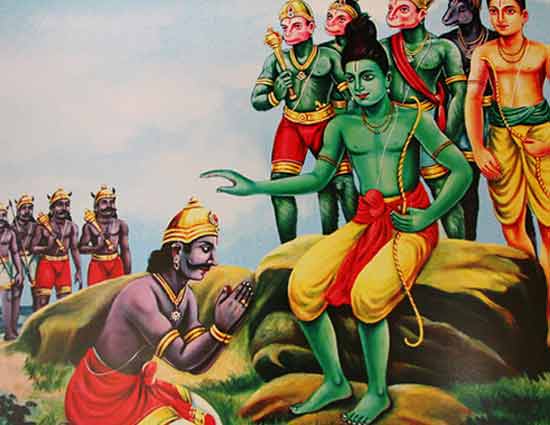 Hanuman also mentioned that Vibhishana is the one who spoke against the capital punishment for a messenger when Ravana announced his verdict. After hearing everyone’s opinion, Rama announced that it is the duty of a human to give refuge to anyone who seeks it. Rama accepted Vibhishana.
Hanuman also mentioned that Vibhishana is the one who spoke against the capital punishment for a messenger when Ravana announced his verdict. After hearing everyone’s opinion, Rama announced that it is the duty of a human to give refuge to anyone who seeks it. Rama accepted Vibhishana.
The opposers were finally convinced when Vibhishana aided Rama in appealing to Samudraraja (or Sethusamudram, the Sea of the Bridge), the ocean itself, who had not given any headway to the building of the bridge under Nala’s leadership. Even the squirrels helped the vanara army in building the bridge. The task took five days to complete with rocks and trees, after Samudraraja had subsided.
As soon as the bridge was built, Rama commanded the army to move across the sea to Lankapuri. The port that they left named after this event as “Setu Shore.” The troops crossed the sea, reached Lankapuri and made camp at the shore.
Ravana sent two spies to gather information about the army. They turned themselves into monkeys and roamed around the camp. Vibhishana identified them as rakshasas and started punishing them. Rama intervened and released them, instructing them to carry the message about the strong and aggressive army to Ravana.
Ravana called his war council again. Ravana’s grandfather, Sumali, recommended releasing Sita and making peace as the best option for the rakshasas. Many in the council turned this down. Ravana showed his anger against his grandfather. When the two spies returned, they described the monkey army and its strength, but it still didn’t change Ravana’s mind. The mandate was sent to Ravana’s commanders to roundup the troops for battle.
More to come…
